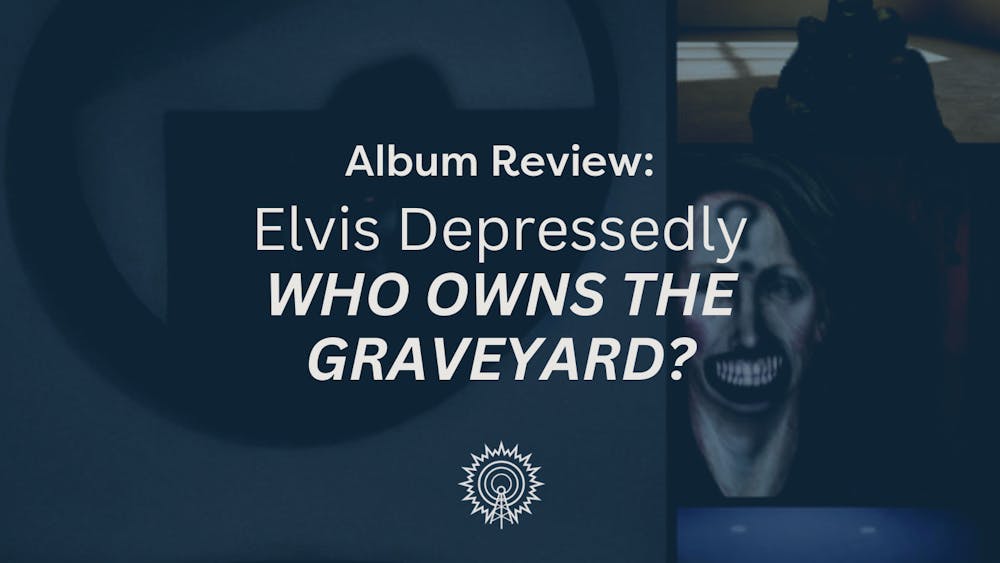
Last month, cult singer-songwriter Mat Cothran debuted what will be the last project released under his moniker Elvis Depressedly. Deeply personal, dark, and immersive, the long-awaited WHO OWNS THE GRAVEYARD? is a fusion of styles and past eras, a sucker punch of a final record imbued in every stitch with a sort of creativity that is rarely found outside the realm of independent production.
The record’s first track, “The 3 American Mantras” is immediately gripping, concise but
hard-hitting in today’s age of sensationalism and televised controversy. Cothran sings, “The
three American mantras are Sex, Death, and Money/ When I look in the mirror I want to see all three,” echoing a struggle all-too-familiar to the disillusioned American: hating the societal standards you also strive to epitomize. Cothran’s solution to participating in the culture without getting swallowed up in it? “Don’t think about it too much.” The unease and cognitive dissonance established in the opener set a fitting tone for the rest of the album’s existential themes.
Pop culture is drawn on again in the structure of the second track, “Say Hi.” Elements of formulaic pop underlay uncharacteristically dark lyrics in a Bo Burnham-esque depression anthem. Still, like every good pop song, the repetition of its refrain drives its message home, ultimately fostering a sense of solidarity among Cothran and others at “the lowest point of [their] life.” It’s a reclamation of mental illness, if a little ironic.
Throughout the record, Cothran oscillates between his predisposition to isolation and his desire for companionship. On “In That Sound,” he discloses, “I know a loneliness you don’t know,” before going on to sing about the comfort of clinging to someone when everything else feels up in the air in “Hold Me Down.” In between, “Piper” is a poignant recollection of the same bittersweet past Cothran seems to be consistently attempting to reconcile with the present and/or move on from.
Knowing which approach to take, of course, is always the hard part. Cothran divulges about his on-and-off relationship with substances in “Sober No More,” which stands out for its painful honesty as well as its old country influences. But later on, in “Jane Again” (a direct reference to his previous album’s “Jane, Don’t You Know Me?”), he ditches his old conscience-stricken perspective for something much more self-assured and unapologetic. Whether the change in outlook is permanent or a temporary byproduct of his mindset on a good day doesn’t seem to matter as much as the apparent potential of his feelings to evolve and exist fluidly. It’s all part of the process, even relapsing.
Sonically, WOTG? is equally dynamic, ranging from doomy and visceral (“On Earth”) to tender and acoustic (“Same Old Way”) back to infectious pop on “Middle Man.” This track could be mistaken for a catchy dance number were it not for lines like “I rot away while no one notices/ I’m getting clean of everything while my mind gives/ I bite my tongue and buy a gun online/ Make peace with God before I cross the finish line.” This jarring contrast mirrors the very dynamic reflected in the song’s lyrics—suffering in silence while the world buzzes on indifferently. Its candid representation of suicidal ideation, including an allusion to Cothran’s own cryptic Instagram posts (“I speak in tongues when I say goodbye online”) earns “Middle Man” a place as one of the record’s most confessional pieces.
The past continues to weigh heavy on Cothran’s mind in the penultimate “Lay It In,” which opens with an extensive list of his admitted failures. Still, his coming clean is laced with an air of finality and the song infused with an odd sense of hope, which culminates in its final lines: “Can’t let myself go out like that/ Riding trauma all the way to death?/ No, no, no...” For the duration of the album, Cothran fluctuates between ever-present emotional states and nurses old wounds that refuse to close up. Acknowledging the necessity of change isn’t a fix-all, but here at least, he recognizes its role as a crucial first step, and ideally, a buffer that keeps him from spiraling. Maybe trauma isn’t something we can rid ourselves of, but it doesn’t have to define us either (We all may realize this more on certain days than others). And as the closing track “My Depression Has Become Funny” suggests, sometimes the only way through is to laugh, or at least make peace with the absurdity of it all. When striving for emotional homeostasis, striking that delicate balance between controlling what we can and accepting what we can’t, a tinge of apathy might even be healthy. It’s better than rage and total despondency. So, yeah, “America is fucked, so what?” Consider it optimistic nihilism.
WHO OWNS THE GRAVEYARD? is an unconventionally raw narrative on the desire for (read: necessity/inevitability of) personal growth in the face of unfavorable conditions, both internal and external. It is an amalgamation—manic, melancholic, worn-out, and defiant. Above all, it is full of heart, however heavy that heart may be. To answer the question posed in the opening lines of “Piper:” “How bad does it hurt? Is it better? What does it feel like?” Well...maybe it depends on the day.

